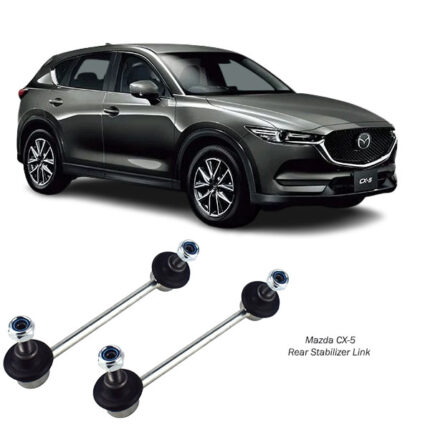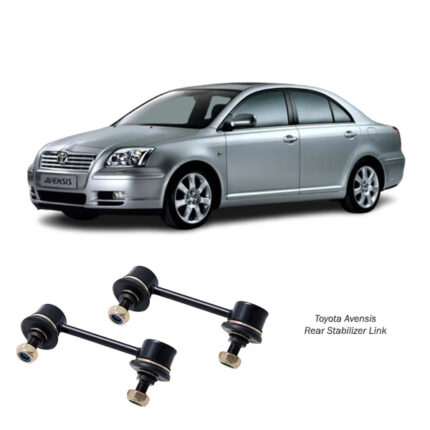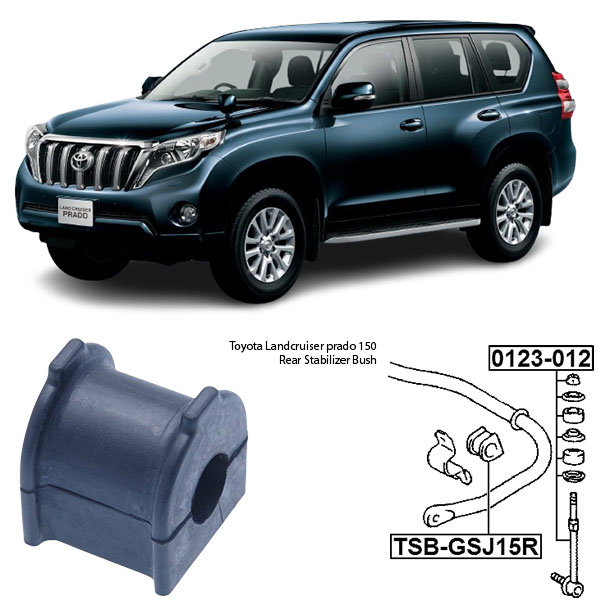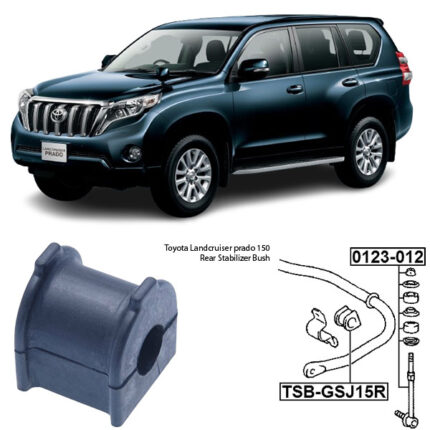Get Toyota Landcruiser Prado 150 Rear Stabilizer Bush TSB-GSJ15R in Kenya
When it comes to the smoothness, balance, and safety of your vehicle’s handling, many people think of shocks, springs, or sway bars — but there’s a small, often overlooked component working just as hard behind the scenes: the Rear Stabilizer Bush.
Though small in size, this part plays a massive role in your car’s suspension system. It helps ensure every turn, corner, and bump on the road is absorbed the right way, giving you better control, comfort, and confidence.
So, what exactly is a Rear Stabilizer Bush, and why is it so important?
🧩 What is a Rear Stabilizer Bush?
The Rear Stabilizer Bush (also known as a sway bar bush or anti-roll bar bush) is a rubber or polyurethane component that cushions the connection between the rear stabilizer bar and the vehicle’s chassis. It keeps the bar tightly in place while still allowing it to twist slightly as needed when the vehicle is turning or going over uneven surfaces.
It might seem like a simple piece of rubber, but this little part is constantly working to keep your vehicle stable and reduce body roll — especially during cornering.
⚙️ Where It Lives & What It Does
-
The stabilizer bar (also called a sway bar or anti-roll bar) connects the left and right sides of the suspension.
-
The rear stabilizer bush holds that bar securely to the car’s frame.
-
As your vehicle turns, the stabilizer bar twists and the bushes absorb the movement, reducing how much the vehicle “leans” into the corner.
Without the bush, the metal-to-metal contact would cause knocking, excessive noise, and accelerated wear. So, in many ways, these bushes are the cushions that protect and perfect your car’s balance.
🔍 Signs of Worn Rear Stabilizer Bushes
Over time, like all rubber parts, the rear stabilizer bushes can deteriorate due to age, heat, moisture, or road conditions. When they start to wear out, you’ll likely notice some or all of the following:
🔊 1. Clunking or Rattling Noises
Especially when going over bumps or driving on uneven roads. The metal stabilizer bar may start knocking against the chassis if the bush is no longer holding it tightly.
🚙 2. Increased Body Roll
If your car suddenly feels “looser” when turning or leans more than usual in corners, it could be due to the stabilizer bush losing its firm grip.
🛞 3. Uneven Tyre Wear
A worn bush can affect the alignment and suspension dynamics, leading to uneven pressure on the tyres — which shows up as irregular wear patterns.
🛠️ 4. Unstable Handling
If the rear of your car feels unpredictable or sways more than it used to, this is a key symptom.
🧪 Materials Matter
Rear stabilizer bushes are typically made from either:
-
Rubber – softer, more flexible, offers a smoother ride, but wears out faster.
-
Polyurethane – stiffer and more durable, improves handling and longevity, but may transmit a bit more road feel into the cabin.
At Onestop Garage & Auto Spares, we offer both options depending on your needs — whether you’re looking for daily driving comfort or performance-oriented stability.
🔧 Why Replacing Your Rear Stabilizer Bush Matters
A damaged or worn bush might seem like a minor issue, but it can affect several critical areas:
-
🔧 Safety: Increased body roll reduces cornering stability.
-
🚗 Comfort: Worn bushes can cause annoying clunking sounds and a rougher ride.
-
🧭 Control: Less stable rear suspension can make the vehicle harder to manage.
-
💸 Longevity: Ignoring the issue can lead to further suspension damage, which means more expensive repairs down the line.
Replacing the rear stabilizer bush is a low-cost, high-impact fix that restores proper handling and extends the life of your suspension system.
👨🔧 Installation – Simple Yet Impactful
Replacing rear stabilizer bushes is generally a straightforward job for a professional technician, though it does involve safely lifting the vehicle, unbolting the stabilizer bar, and removing the old bushes.
At Onestop Garage, we make the process seamless:
✅ Quick diagnosis
✅ Quality parts installed by trained professionals
✅ Full suspension check for peace of mind
Whether you’re coming in for service or just need the part delivered to your doorstep, we’ve got your back!
🔁 When to Replace Rear Stabilizer Bushes?
We recommend inspecting them during routine maintenance, especially if your vehicle:
-
Has clocked over 60,000 KM
-
Drives on rough roads or off-road frequently
-
Shows any of the symptoms mentioned above
Prevention is always better than cure — and in this case, cheaper too.
⚙️ Final Thoughts: Small Part, Big Impact
The Rear Stabilizer Bush might not be the flashiest component in your vehicle, but its role is absolutely critical. Without it, your suspension system would feel loose, noisy, and unstable. It’s the kind of part you don’t think about — until it starts to fail.
By staying proactive and replacing worn bushes on time, you can:
✅ Improve handling
✅ Enhance ride comfort
✅ Avoid bigger, costlier suspension issues down the line
Follow us on Facebook for more parts.




